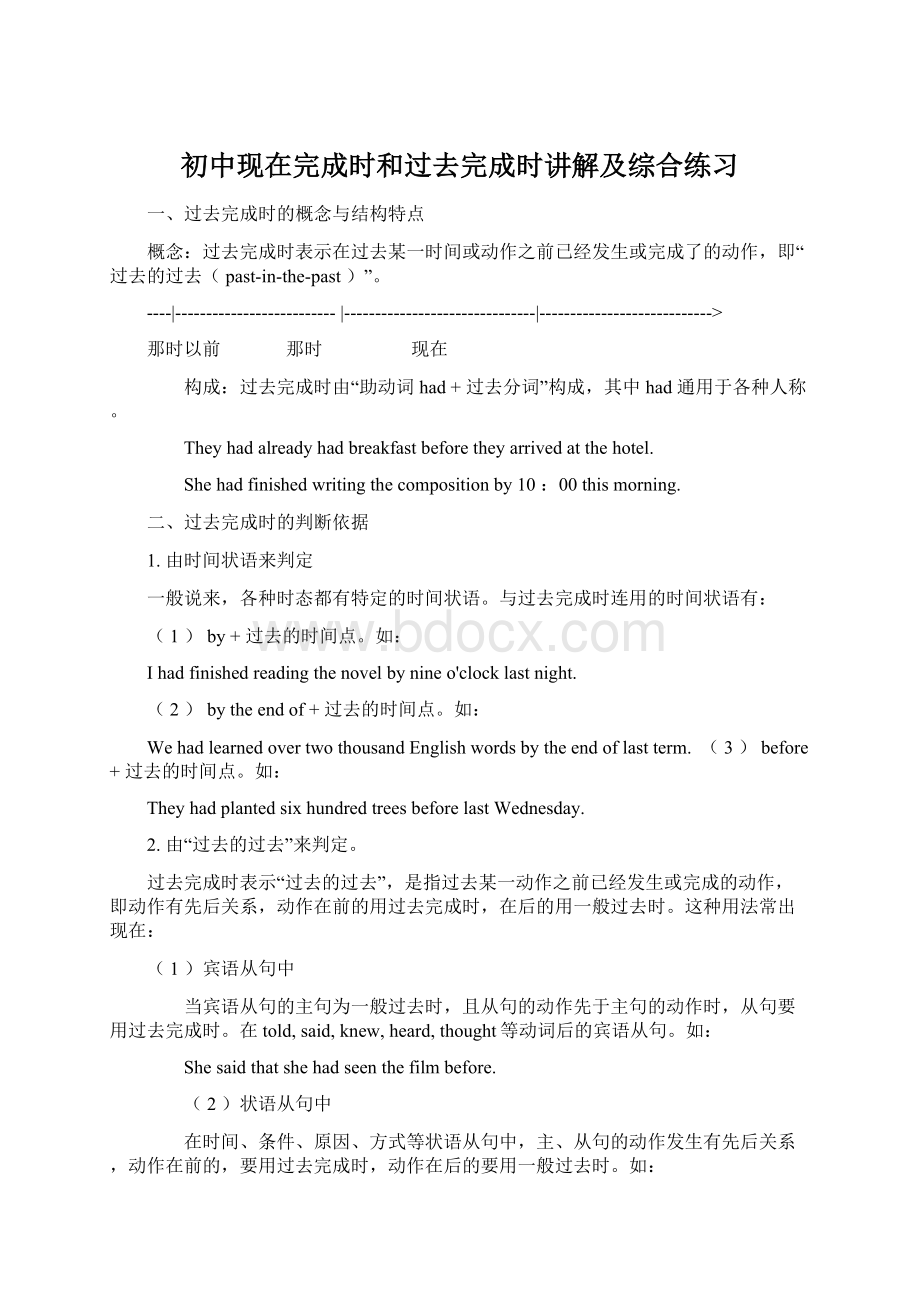初中现在完成时和过去完成时讲解及综合练习.docx
《初中现在完成时和过去完成时讲解及综合练习.docx》由会员分享,可在线阅读,更多相关《初中现在完成时和过去完成时讲解及综合练习.docx(15页珍藏版)》请在冰豆网上搜索。

初中现在完成时和过去完成时讲解及综合练习
一、过去完成时的概念与结构特点
概念:
过去完成时表示在过去某一时间或动作之前已经发生或完成了的动作,即“过去的过去(past-in-the-past)”。
----|--------------------------|-------------------------------|---------------------------->
那时以前 那时 现在
构成:
过去完成时由“助动词had+过去分词”构成,其中had通用于各种人称。
Theyhadalreadyhadbreakfastbeforetheyarrivedatthehotel.
Shehadfinishedwritingthecompositionby10:
00thismorning.
二、过去完成时的判断依据
1.由时间状语来判定
一般说来,各种时态都有特定的时间状语。
与过去完成时连用的时间状语有:
(1)by+过去的时间点。
如:
Ihadfinishedreadingthenovelbynineo'clocklastnight.
(2)bytheendof+过去的时间点。
如:
WehadlearnedovertwothousandEnglishwordsbytheendoflastterm. (3)before+过去的时间点。
如:
TheyhadplantedsixhundredtreesbeforelastWednesday.
2.由“过去的过去”来判定。
过去完成时表示“过去的过去”,是指过去某一动作之前已经发生或完成的动作,即动作有先后关系,动作在前的用过去完成时,在后的用一般过去时。
这种用法常出现在:
(1)宾语从句中
当宾语从句的主句为一般过去时,且从句的动作先于主句的动作时,从句要用过去完成时。
在told,said,knew,heard,thought等动词后的宾语从句。
如:
Shesaidthatshehadseenthefilmbefore.
(2)状语从句中
在时间、条件、原因、方式等状语从句中,主、从句的动作发生有先后关系,动作在前的,要用过去完成时,动作在后的要用一般过去时。
如:
WhenIgottothestation,thetrainhadalreadyleft.
Afterhehadfinishedhishomework,hewenttobed.
注意:
before,after引导的时间状语从句中,由于before和after本身已表达了动作的先后关系,若主、从句表示的动作紧密相连,则主、从句都用一般过去时。
如:
Wheredidyoustudybeforeyoucamehere?
Afterheclosedthedoor,helefttheclassroom.
(3)表示意向的动词,如hope,wish,expect,think,intend,mean,suppose等,用过去完成时表示"原本…,未能…"
Wehadhopedthatyouwouldcome,butyoudidn't.
3.根据上、下文来判定。
ImetWangTaointhestreetyesterday.Wehadn'tseeneachothersincehewenttoBeijing.
三、过去完成时的主要用法
1.过去完成时表示一个动作或状态在过去某一时间或动作之前已经完成或结束,即发生在“过去的过去”。
如:
WhenIwokeup,ithadstoppedraining.
我醒来时,雨已经停了。
(主句的动作发生在“过去的过去”)
2.过去完成时是一个相对的时态,表示的是“过去的过去”,只有和过去某一时间或某一动作相比较时才使用它。
如:
Hetoldmethathehadwrittenanewbook.(hadwritten发生在told之前)
3.过去完成时需要与一个表示过去的时间状语连用,它不能离开过去时间而独立存在。
此时多与already,yet,still,just,before,never等时间副词及by,before,until等引导的短语或从句连用。
如:
BeforeshecametoChina,GracehadtaughtEnglishinamiddleschoolforaboutfiveyears.
Peterhadcollectedmorethan300Chinesestampsbythetimehewasten.
4.过去完成时表示某一动作或状态在过去某时之前已经开始,一直延续到这一过去时间,而且动作尚未结束,仍然有继续下去的可能。
如:
Bytheendoflastyear,hehadworkedinthefactoryfortwentyyears.(hadworked已有了20年,还有继续进行下去的可能)
四、过去完成时与现在完成时的区别
现在完成时表示的动作发生在过去,但侧重对现在产生的结果或造成的影响,与现在有关,其结构为“助动词have(has)+过去分词”;过去完成时则是一个相对的时态,它所表示的动作不仅发生在过去,更强调“过去的过去”,只有和过去某时或某动作相比较时,才用到它。
试比较:
Ihavelearned1000Englishwordssofar.
到目前为止我已经学会了1000个英语单词。
Ihadlearned1000Englishwordstillthen.
到那时为止我已经学会了1000个英语单词。
—I'msorrytokeepyouwaiting.对不起,让你久等了。
—Oh,notatall.Ihavebeenhereonlyafewminutes.
没什么,我只等了几分钟。
(“等”的动作从过去某一时间点持续到现在)
—Johnreturnedhomeyesterday.约翰昨天回到家的。
—Wherehadhebeen?
他去哪儿了?
(答语中使用过去完成时是指约翰在returnedhome之前去了哪些地方,即“过去的过去”)
五、过去完成时与一般过去时的区别
虽然这两种时态都表示过去发生的动作或存在的状态,但在使用时应注意以下几点:
1.时间状语不同:
过去完成时在时间上强调“过去的过去”;而一般过去时只强调过去某一特定的时间。
试比较:
Theyhadarrivedatthestationbytenyesterday.
Theyarrivedatthestationattenyesterday.
2.在没有明确的过去时间状语作标志时,谓语动词动作发生的时间先后须依据上下文来判断:
先发生的用过去完成时,后发生的则用一般过去时。
如:
Shewasveryhappy.Herwholefamilywerepleasedwithher,too.Shehadjustwonthefirstinthecompositioncompetition.
3.当两个或两个以上接连发生的动作用and或but连接时,按时间顺序,只需用一般过去时来代替过去完成时;另外,在before,after,assoonas引导的从句中,由于这些连词本身已经表示出时间的先后,因此也可以用过去时来代替过去完成时。
如:
Heenteredtheroom,turnedonthelightandreadaneveningpaper.
I(had)calledherbeforeIlefttheoffice.
英语过去完成时重难点实例讲解
要掌握好英语过去完成时,最关键的一点是要掌握它的含义。
现在很多的文章在讲解过去完成时的时候,都用了一句流行的说法,叫“过去的过去”。
虽然这样的概括点明了过去完成时的要点,但究竟什么才叫“过去的过去”呢?
如果不搞清它的含义,只是去记住什么时间状语(如:
before,by,until,when,after等),或者记住哪些动词常用于过去完成时等等,是不能很好掌握过去完成时的。
一、重点
英语中,已经有了一个过去一般时表示在过去发生的动作,为什么还有过去完成时呢?
要记住:
过去完成时的关键概念是:
假设在过去发生了两件(或以上)的事件,一件是A事件,另一件是B事件,如果A、B两个事件几乎是同时发生的,那就用一般过去时;但是,如果A、B两个事件不是同时发生的,怎么办呢?
那就是:
哪个事件先发生,就用过去完成时;哪个事件后发生,就用过去完成时。
在上面的假设中,如果A事件先发生,A就用过去完成时;如果B事件先发生,B就用过去完成时;而不管两件事是用什么样的时间状语或其它形式表示的。
请看例句:
[例1]Shesaid(that)shehadneverbeentoParis.
[例2]Whenthepolicearrived,thethieveshadrunaway.
[例3]Wehadhopedthatyouwouldcome,butyoudidn't.
[例4]Tomwasdisappointedthatmostoftheguestshadleftwhenhearrivedattheparty.
[例5]Thestudentswerewriting,busilywhenMissBrownwenttogetabookshehadleftintheoffice.
在上面的五个例子中,我们只要稍微分析一下,就可以发现:
每个例子讲述的内容中,都包含着两个(或以上)在过去发生的事件。
我们将两件事抽取出来看一下,就非常明白:
必定有一件事是先生的,另一件是后发生的:
[例1]……said……hadneverbeento (先没有“去”,后“说”)
[例2]……arrived……hadrunaway.(先“跑”了,后“到”)
[例3]……hadhoped……wouldcome……didn't(先“希望”,后才发生“没去”)
[例4]……wasdisappointed……hadleft……arrived(先“离开”,后“到达”和“失望”)
[例5]……werewriting……went……hadleft (先“离开”,后“到”和“写”)
二、难点
过去完成时的难点在于:
有时候一句话中并没有出现两个事件,因此无法比较两个事件的先后。
那为什么也用过去完成时呢?
请看下面的例句:
[例1]Bythetimehewastwelve,Edisonhadbegantomakealivingbyhimself.
实际上,在上面的例句中,仍然有着“先、后”之分的。
不过,这次不是A、B两件事件的先后,而是有两个过去时间的“先、后”关系。
首先,句子中有个明确的过去时间点:
12岁。
说他“12岁”,显然是过去式。
那么,紧接着说“他已经开始谋生了”,这个“谋生”是发生在“12岁”时,还是“12岁”前,还是“12岁”后?
答案是肯定的:
他的“谋生”发生在“12岁”之前!
也就是说,“12岁”已经是一般过去时,而在“12岁”之前发生的事,当然是过去完成时。
所以,在那么多表示时间状语的词中,大家要特别注意By、Until等的用法。
可以说,在讲述过去的事件中,如果出现By……时间状语,很有可能要用过去完成时了。
(当然,我说的是很有可能。
)
类似的时间表达方式还有Until、Before等。
只要大家把握了过去完成时的基本含义,不管句子怎么变化,应该没有多大的问题。
例如:
[例2]Untilthen,hisfamilyhadn'theardfromhimforsixmonth.
此句的分析同上面差不多。
首先有个明确的过去时间点"then"(那时),而"hadn'theard"发生在then之前(包括then)。
所以此句用的是过去完成时。
再举两个例子,请大家自己分析:
[例3]Wehadlearnedabout4000Englishwordsbytheendoflastterm.
[例4]Iwaiteduntilhehadfinishedhishomework.
[例5]Wehadgottothestationbefore10:
00.
过去完成时练习和分析
[提示]请先阅读本站的文章“过去完成时重难点实例讲解”,然后完成下列练习。
汉译英1.到上学期你们学会了多少首歌?
2.到昨天晚上,他把这篇课文读了三遍。
3.十点钟前,我们到达了车站。
4.在他上中学之前,已学会了两百多个英语单词。
5.当我们到达电影院时,电影已经开始五分钟了。
6.昨天找看见李平了。
自从我们离开北京,就一直没有见面。
7.我昨天没有给魏华那本书,因为她已经为自己买了一本。
8.他问李先生是否已经回来了
9.我听说他住那五年了。
1. Howmanysongshadyoulearnedbytheendoflastterm?
[注]两个时间点的比较。
2.Byyesterdayevening,hehadreadthetextthreetimes.
[注]两个时间点的比较。
3.Wehadgottothestationbefore10:
00.
[注]两个时间点的比较。
4.HehadlearnedtwohundredEnglishwordsbeforehewenttomiddleschool.
[注]两个事件的比较。
5.Whenwegottothecinema,thefilmhadbeenonforfiveminutes.
[注]两个事件的比较。
6.IsawLiPingyesterday.WehadnotseeneachothersinceweleftBeijing.
[注]两个事件的比较。
7.IdidnotgivethebooktoWeiHuayesterday,becauseshehadalreadyboughtacopyforherself.
[注]两个事件的比较。
8.HeaskedifMrLihadalreadycomeback.
[注]两个事件的比较。
9.Iheardhehadlivedthereforfiveyears.
[注]两个事件的比较。
练习
1Theyusually_____TVintheevening.
A.watch B.willwatch C.arewatching D.watches
2Thesun___intheeastand___inthewest.
A.raises;set B.rise;sets C.rises;sets D.rises;set
3Ourteacherwillreturnbythetimeschool________.
A.willbegin B.began C.isbeginning D.begins
4-Iusuallyhavemilkandbreadforbreakfast.Whataboutyou,Jim?
-SodoI,butmysister___.
A.hasn't B.doesn't C.didn't D.won't
5-Thattenpoundnotebelongstome. --__________
A.Yes,itbelongsB.No,itdoesn'tC.Yes,itisD.No,itisn't
6Shewillgoifit___tomorrow.
A.isn'train B.don'train C.doesn'train D.didn'train
初中英语综合时态练习
(1)
B.1.Mysister_____theYouthLeaguelastyear.She_____aYouthLeaguememberforaboutayearnow.
A.joined…hasbecomeB.joined…hasbeenC.hasjoined…hasbeenD.didjoin…hadbeen
C.2.Neitherofus______adoctor.
A.wereB.amC.isD.are
C.3.MrZhaodoesn’tlikeswimming,_____?
A.didn’theB.didheC.doesheD.won’the
C.4.I’lltalktohimwhenhe______.
A.comeB.willcomeC.comesD.came
C.5.They_____supperwhenwe_____intotheroom.
A.arehaving…wentB.werehaving…goC.werehaving…wentD.arehaving…go
D.6.We’llgoclimbingifit_____tomorrow.
A.won’trainB.didrainC.isn’trainD.doesn’train
A.7.Idon’tknowifit_____tomorrow.
A.willrainB.rainsC.rainedD.israin
D.8.NathanHale____he____hislifeforhiscountry.
A.said…giveB.says…willgiveC.said…givesD.said…wouldgive
C.9.Mostpeople____TV.
A.enjoytowatchB.enjoywatchC.enjoywatchingD.enjoyswatching
A.10.Father____hiscapandwentout.
A.putonB.putsonC.hadputD.willputon
B.11.Howlong_____youruncle____inthearmy?
A.has…joinedB.has…beenC.does…joinD.had…joined
D.12.Peter_____theworkinaweek.
A.havefinishedB.finishesC.isfinishingD.willfinish
A.13.Thestudents_____theHistoryMuseumifit_____finetomorrow.
A.willvisit….isB.willvisit…willbeC.wouldvisit…wasD.wouldvisit…wouldbe
A.14.Joan____mewhetherI_____thebookbefore.
A.asked…hadreadB.asked…shallreadC.asked…wouldreadD.asked…hasread
C.15.Bytheendoflastterm,we_____BookFive.
A.havelearnedB.wouldlearnC.hadlearnedD.werelearning
A.16._____she_____herlessonsatsevenyesterdayevening?
A.Was…goingoverB.Is…gooverC.Has…goneoverD.Will…goover
C.17.Hecan’tgotothecinemawithmebecausehe____ameeting.
A.washavingB.wouldhaveC.ishavingD.had
A.18.Bothofthetwodictionaries____veryuseful.
A.areB.isC.wasD.am
C.19.He_____tomesincelastmonth.
A.didn’twriteB.hadn’twrittenC.hasn’twrittenD.won’twrite
D.20.XuPing____toJapanonlyonce.
A.hasgoneB.hadgoneC.hadbeenD.hasbeen
B.21.Nobody____theanswer.
A.haveknownB.knewC.didn’tknowD.areknowing
B.22.______youever____toNanjing?
A.Have…goneB.Have…beenC.Do…goD.Will…go
C.23.He____he____somethingwrongbefore.
A.says…was